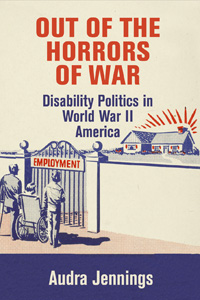
Out of the Horrors of War: Disability Politics in World War II America
A volume in the Politics and Culture in Modern America series
"Policy history with the people left in, Out of the Horrors of War shows that the labor shortage of WWII sparked a drive for disability rights much earlier than generally recounted. Audra Jennings astutely reveals how conflicts within the Truman administration, strong personalities, and contrasting concepts of rehabilitation waylaid the efforts of people with disabilities to obtain full economic citizenship."—Eileen Boris, coauthor, Caring for America: Home Health Workers in the Shadow of the Welfare State
"Audra Jennings is a tenacious and creative researcher who has produced an important contribution to the history of disability and disability rights movements in the United States."—Felicia Kornbluh, University of Vermont
"Out of the Horrors of War situates the origins of the disability rights movement squarely in the postwar period and persuasively revises the American narrative of citizenship and rights."—Kim Nielsen, University of Toledo
From workplace accidents to polio epidemics and new waves of immigration to the returning veterans of World War II, the first half of the twentieth century brought the issue of disability—what it was, what it meant, and how to address it—into national focus. Out of the Horrors of War: Disability Politics in World War II America explores the history of disability activism, concentrating on the American Federation of Physically Handicapped (AFPH), a national, cross-disability organization founded during World War II to address federal disability policy. Unlike earlier disability groups, which had been organized around specific disabilities or shared military experience, AFPH brought thousands of disabled citizens and veterans into the national political arena, demanding equal access to economic security and full citizenship. At its core, the AFPH legislative campaign pushed the federal government to move disabled citizens from the margins to the center of the welfare state.
Through extensive archival research, Audra Jennings examines the history of AFPH and its enduring legacy in the disability rights movement. Counter to most narratives that place the inception of disability activism in the 1970s, Jennings argues that the disability rights movement is firmly rooted in the politics of World War II. In the years immediately following the war, leaders in AFPH worked with organized labor movements to advocate for an ambitious political agenda, including employer education campaigns, a federal pension program, improved access to healthcare and education, and an affirmative action program for disabled workers. Out of the Horrors of War extends the arc of the disability rights movement into the 1940s and traces how its terms of inclusion influenced the movement for decades after, leading up to the Americans with Disabilities Act of 1990.
Available from Penn Press, Amazon.com, and Barnes and Noble.